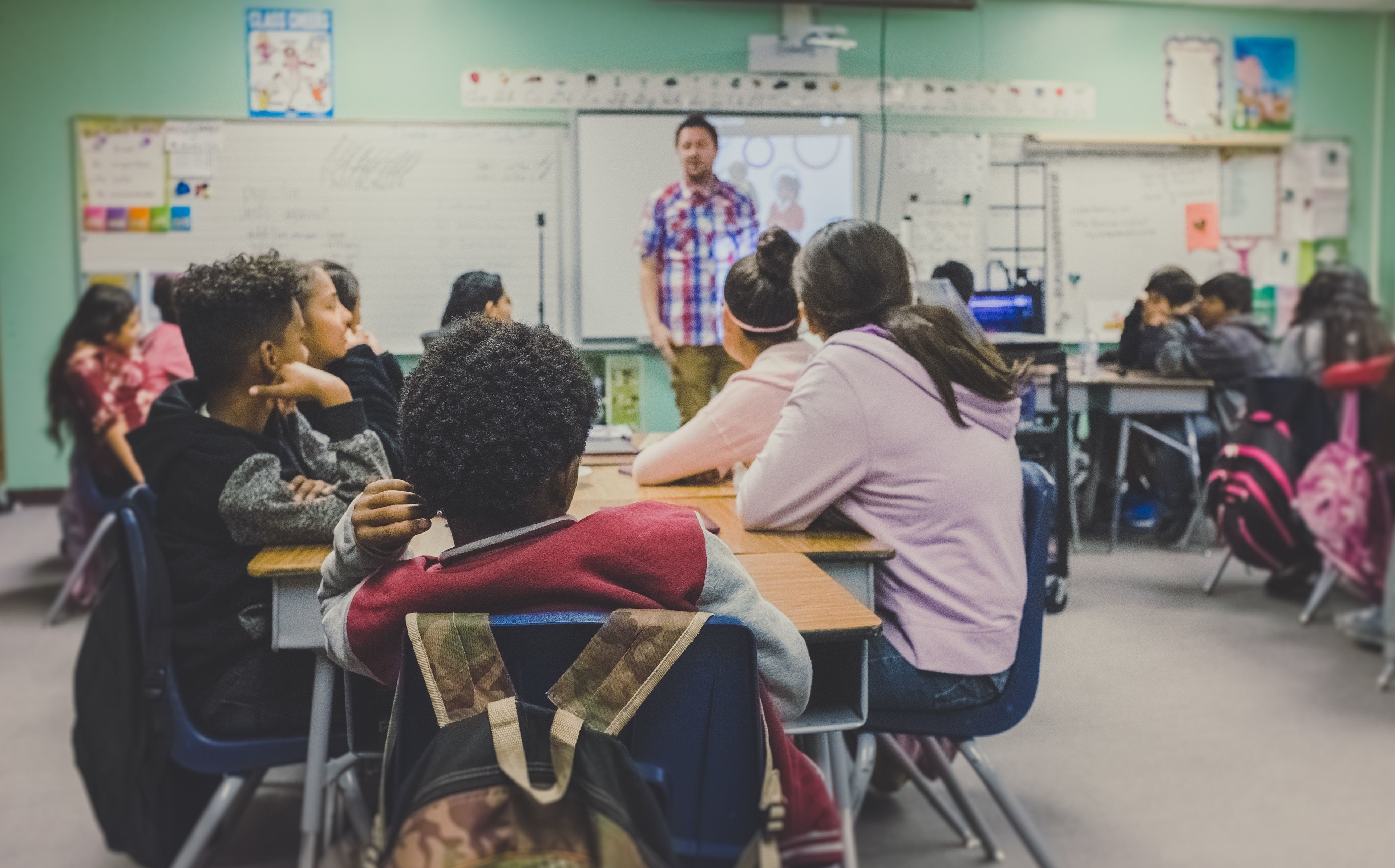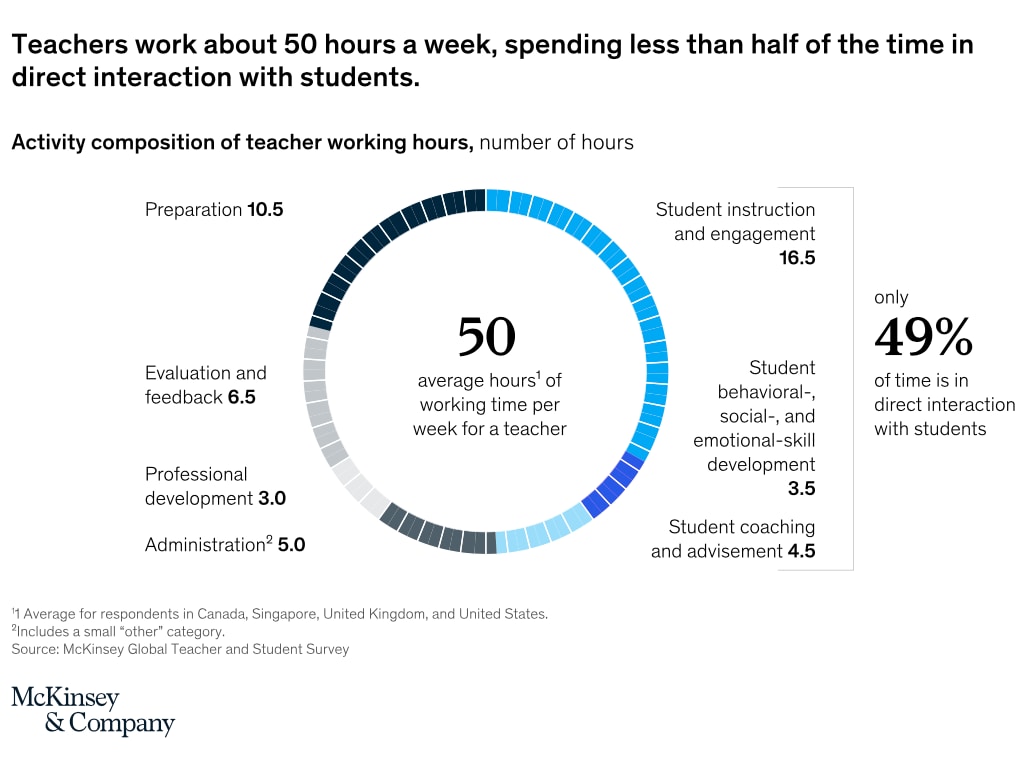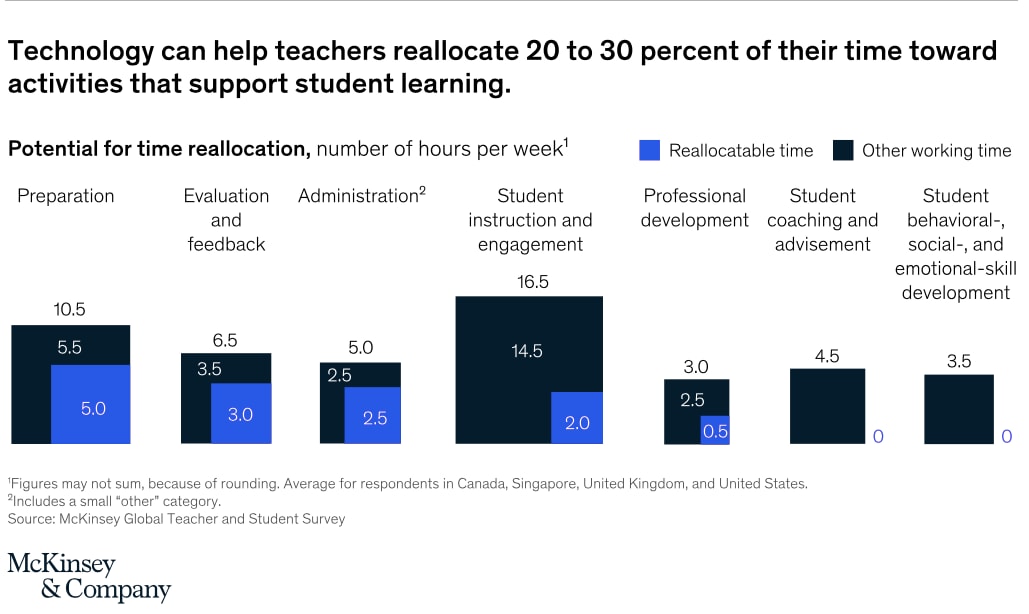How AI can accelerate students’ holistic development and make teaching more fulfilling

AI can free up time in the classroom.
Image: Kenny Eliason on Unsplash
Stay up to date:
Society and Equity
Listen to the article
- Advances in artificial intelligence (AI) could transform education systems and make them more equitable.
- It can accelerate the long overdue transformation of education systems towards inclusive learning that will prepare young people to thrive and shape a better future.
- At the same time, teachers can use these technologies to enhance their teaching practice and professional experience.
With the rapidly accelerating integration of artificial intelligence (AI) in our work, life, and classrooms, educators all over the world are re-evaluating the purpose of education in light of these outsized implications. At Teach For All and the LEGO Foundation, we see the potential of AI to accelerate the long overdue transformation of education systems towards inclusive learning that will prepare young people to thrive and shape a better future.
At the same time, we see huge opportunities for teachers to use these technologies to enhance their own teaching practice and professional experience.
Dialogue on the future of work and education has long emphasized the importance of developing skills and values that are uniquely human and less likely to be replaced by technology. The rise of ChatGPT is yet another proof point. Most students and teachers agree that ChatGPT is “just another example of why we can’t keep doing things the old way for schools in the modern world”. (Although please note that this blog was written in the "old way" as an interactive collaboration between humans, and not generated by AI.)
How AI tools can help educators and students
Our hope is that the advent of AI will spur educators, students, parents, and policy-makers to come together to consider what skills our students really need to navigate uncertainty, solve complex challenges and shape meaningful futures in a changing economy. This means embracing the challenge to provide learning that fosters agency, awareness, critical thinking and problem-solving skills, connectedness, and well-being. We already see that AI tools deployed by well-trained and well-supported teachers can be invaluable for accelerating progress towards this vision.
AI can help foster the skills students will need to navigate and shape the future. Tools like ChatGPT, as Dr. Kathy Hirsh-Pasek and Elias Blinkoff argue, can help promote students’ critical thinking when used in sophisticated ways for deeper, more engaged learning.
Vriti Saraf, CEO and founder of K20 Educators, in New York, agrees: “The less students need educators to be the main source of knowledge, the more educators can focus on developing the ability to curate, guide, critically assess learning, and help students gain skills that are so much more important than memorizing information.”

Noting the increased importance of social-emotional learning, Henry May, CEO of Co-School in Bogota, Colombia, notes that teachers have an essential role in shaping childhood experiences away from screens. So, "teachers must be trained on how to educate students on ethical principles; how to use AI tools appropriately; and how to mitigate the potential risk of AI to reduce human connection and belonging and increase loneliness."
Another potential benefit is that AI can free up time in the classroom. Teachers often cite unmanageable administrative tasks as their greatest source of exhaustion and burnout. By automating routine administrative tasks, AI could help streamline teacher workflows, giving them more time to build relationships with students and foster their learning and development.

A classroom view of AI tools
Quim Sabría, a former teacher in Barcelona, Spain and co-founder of Edpuzzle, says AI could improve teacher productivity across areas like lesson planning and differentiation, grading and providing quality feedback, teacher-parent communication, and professional development.
In Lagos, Nigeria, teachers are beginning to see the efficiency and ease that AI brings to their work. Oluwaseun Kayode, who taught in Lagos and founded Schoolinka, is currently seeing an increasing number of teachers from across West Africa using AI to identify children’s literacy levels, uncover where students are struggling, and deepen personalized learning experiences.
In the US state of Illinois, a similar pattern is seen where Diego Marin, an 8th-grade math teacher, likens ChatGPT to “a personalized 1:1 tutor that is super valuable for students.”
How is the World Economic Forum ensuring the responsible use of technology?
Equitable use of AI in education
We see tremendous promise for AI to spur educators around the world to reorient their energy away from routine administrative tasks towards accelerating students’ growth and learning, thus making teaching more fulfilling.
But we need to stay vigilant to ensure that AI is a force for equity and quality. We’ve all heard stories of technology being used to create shortcuts for lesson planning, and we must keep fine-tuning AI so that it does not replicate existing biases.
AI tools can be a catalyst for the transformation of our education systems but only with a commitment to a shared vision for equitable holistic education that gives all children the opportunity to thrive. To ensure AI benefits all students, including the most marginalized, we recommend being mindful of the following principles:
- Co-creation: Bring together ed-tech executives and equity-conscious educators from diverse communities to collaborate on applications of AI that reflect strong pedagogy, address local needs and cultural contexts, and overcome existing biases and inequities.
- Easy entry points: Support teachers to access and apply technologies to reduce administrative burdens and provide more personalized learning by providing open access resources and collaborative spaces to help them integrate AI into their work.
- Digital literacy: Invest in IT fundamentals and AI literacy to mitigate the growing digital divide, ensuring access to devices, bandwidth, and digital literacy development for teachers and students to overcome barriers.
- Best practice: Collect and shareinspiring examples of teachers using technologies to support student voice, curiosity, and agency for more active forms of learning to help inspire other teachers to leverage AI in these ways.
- Innovation and adaptation: Work with school leaders to support teacher professional development and foster a culture of innovation and adaptability. Recognize and reward teachers for new applications of AI and encourage peer-to-peer learning and specialized training.
Accept our marketing cookies to access this content.
These cookies are currently disabled in your browser.
Don't miss any update on this topic
Create a free account and access your personalized content collection with our latest publications and analyses.
License and Republishing
World Economic Forum articles may be republished in accordance with the Creative Commons Attribution-NonCommercial-NoDerivatives 4.0 International Public License, and in accordance with our Terms of Use.
The views expressed in this article are those of the author alone and not the World Economic Forum.
Related topics:
Forum Stories newsletter
Bringing you weekly curated insights and analysis on the global issues that matter.
More on Forum InstitutionalSee all
World Economic Forum
June 26, 2025
Pooja Chhabria and Gayle Markovitz
June 25, 2025
Pooja Chhabria and Gayle Markovitz
June 24, 2025
Pooja Chhabria and Gayle Markovitz
June 23, 2025
Pooja Chhabria and Christina Schunck
June 10, 2025
World Economic Forum
May 16, 2025





